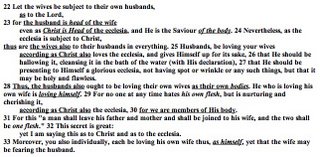Compare
"The Father is loving the Son and has given all into His hand. He who is believing in the Son has life eonian, yet he who is stubborn as to the Son shall not be seeing life, but the indignation of God is remaining on him." (Jh 3:35,36)
with
God locks up all together in stubbornness, that He should be merciful to all. (Ro 11:36)
Stubbornness. How often do we encounter people who are stubborn as to the truth (Ro 2:8)? Or stubborn towards the faith in Christ Jesus, the faith that saves? It is a simple fact that not for all is the faith (2Th 3:2, CV), which we painfully experience everyday. The gift of faith (cp. e.g. Ro 12:3; Phil 1:29) will not come into the possession of all during their lifetime, but only those who were chosen beforehand will receive it and walk in it (cp. Ro 8:28-30*; Eph 1:4,5; 1Th 2:13; etc.). Fact is that at the unveiling of the Lord Jesus from heaven with His powerful messengers, in flaming fire, He will be dealing out vengeance to those who are not acquainted with God and those who are not obeying the evangel of our Lord Jesus Christ (cp. 2Th 1:7,8). This declaration will come true just as any other divine prediction of events in the future.
Why, then, do some receive faith or are graciously granted to believe in Christ (Phil 1:29)?
God's goal with His creation is reconciliation (cp. Col 1:16-20). This reconciliation includes those on the earth and those in the heavens (v.20). At that point in time when God will reconcile all to himself, all of mankind will be constituted just (Ro 5:18,19), and will be vivified (1Cor 15:21,22). This all happens at the consummation (1Cor 15:23c, CV), at the conclusion of the eons (cp. 1Cor 10:11; Eph 1:10; Heb 9:26, all in CV).
In the plan of God, Israel will be the light on and the salt of this earth (Mt 5:13-16), during the two impending eons, the millennial kingdom and the new creation eon=. They are the nation through which humanity will learn who God is (e.g. Ezekiel 36:23,36; Isa 26:9). God will display His might and power on this earth by means of them for all of mankind to see and admire. Nations will flock to the land of Israel after its Rescuer has arrived, gathered His chosen nation, and restored the kingdom to it (cp. Ac 1:6, 3:17-21)--they will come to worship and pay tribute to the God of that one nation (Ps 66:3-4, 67:1-7, 72:11; Isa 2:1-5, 25:6-8; etc.).
What about the heavens, though? We know from Col 1:20 that there are also beings that are at enmity with God, because they will be reconciled. God created the heavens and the earth in the beginning (Gen 1:1), which are populated by invisible as well as visible beings (read for example Eph 1:2, 2:6, 3:10, 6:12; Col 1:16-17). God, just as he deals with His visible creation on the earth through Israel, deals with the invisible creation through the body of Christ, who are the believers today+ (Eph 1:1, 2:11-22). Through this body of believers, the new creation, God displays His transcendent riches of His grace and His multifarious wisdom among the celestial beings (Eph 2:6,7, 3:10), that way bringing all knees to bow, celestial and terrestrial and subterranean, and every tongue to acclaim that Jesus Christ is Lord, for the glory of God, the Father (Ph 2:9-11; also Eph 1:10 and Col 1:18-20).
Placing these things in front of our mind's eye, we can easily see why there is stubbornness. Without it, God would not be able to display anything, not His power or strength, nor His love. There cannot be light without darkness.
Next time we encounter stubbornness or unbelief as to the truth, we can prayerfully bow our heads and say, Amen, God, thus You have decreed! I will not despair, but rest in peace in Your will, expecting fully Your wisdom, for You lock up all in stubbornness, that You should be merciful to all.
Amen!
--------------------
* Ro 8:28-30: Now we are aware that God is working all together for the good of those who are loving God, who are called according to the purpose that, whom He foreknew, He designates beforehand, also, to be conformed to the image of His Son, for Him to be Firstborn among many brethren. Now whom He designates beforehand, these He calls also, and whom He calls, these He justifies also; now whom He justifies, these He glorifies also.
= For a scripturally founded explanation of what the eons are, please visit http://www.concordant.org/expohtml/TheEons/TheDivineCalendar.html.
+ This, of course, requires further exposition. Briefly put, the letter commonly called 'Ephesians' was in reality a circular, that is, a letter addressed to all believers in Christ Jesus at that time (Eph 1:1). In it, Paul explains, that those out of the nations were, in that era, apart from Christ [...] and without God in the world. Yet now, in Christ Jesus, you, who once are far off, are become near by the blood of Christ. [...] And Christ creates the two (Jews and gentiles) into one new humanity. Consequently, then, no longer are the nations guests and sojourners, but are fellow-citizens of the saints and belong to God's family (cp. Eph 2:11-22). This describes a major shift in relations between Jews and nations. Where there was enmity between the two, there now is peace. Both are unified into one new group of saints in Christ, which is the body of Christ, the Church (cp. Eph 1:22).


